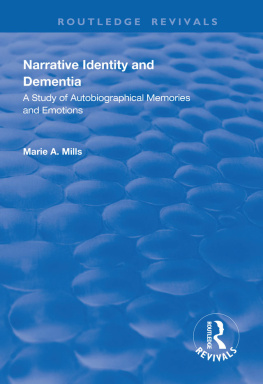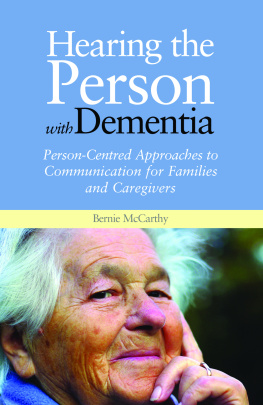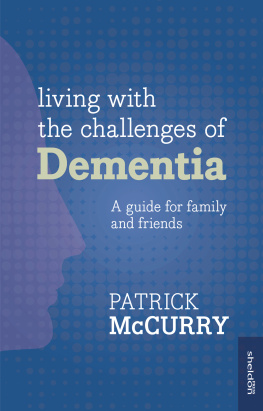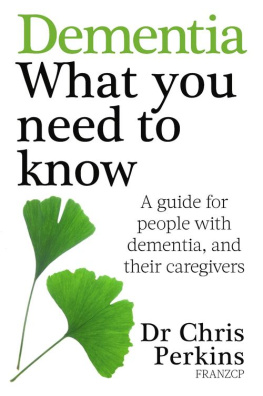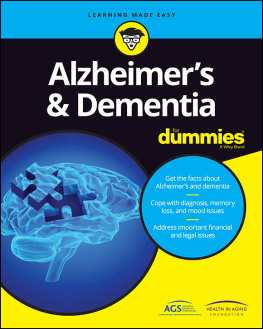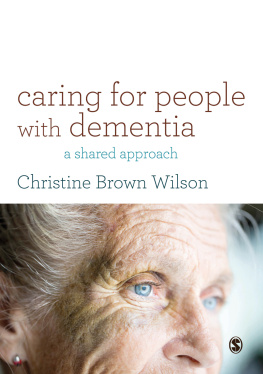First published in Hungarian in 2014
English language edition first published in 2016 by Hammersmith Health Books
an imprint of Hammersmith Books Limited
4/4a Bloomsbury Square, London WC1A 2RP, UK
www.hammersmithbooks.co.uk
2014, 2016, Agnes B. Juhasz
All rights reserved. No part of this publication may be reproduced, stored in any retrieval system or transmitted in any form or by any means, electronic, mechanical, photocopying, recording or otherwise, without the prior permission of the publishers and copyright holder.
Note: Whilst the advice and information in this book are believed to be true and accurate at the date of going to press, neither the author nor the publisher can accept any legal responsibility or liability for any errors or omissions that may be made.
Authors note: Sylvia is a fictional person created by the Author as a result of her experience of caring for numerous people who had different types of dementia.
British Library Cataloguing in Publication Data: A CIP record of this book is available from the British Library.
ISBN (print edition): 978-1-78161-096-1
ISBN (ebook): 978-1-78161-097-8
English Language Translation Advisor: Rosie Abensour
Commissioning editor: Georgina Bentliff
Edited by: Ruth Atkinson
Cover design and typesetting by: Sylvia Kwan
Production: Helen Whitehorn, Path Projects Ltd
Printed and bound by: TJ International Ltd of Padstow, Cornwall, UK
My school and college years were pure fun rather than being the basis of my future profession. I had no idea that years later I would be so passionate about being a healthcare professional. Back then, I always used to say: Ill never work in healthcare, not even for 24 hours. This attitude made me very popular among my classmates and I kept my promise for over a decade after leaving school, more or less, as my interests moved towards very different areas where I was given the opportunity to express myself through journalistic work, which I really enjoyed.
All this changed fundamentally when I decided to move from my home in Hungary to Australia. There is a huge need for nurses in the land of kangaroos, so it seemed to be a good idea to sign up for a nursing course. I got my Diploma and became an Endorsed Enrolled Nurse (EEN) two years later. I had no worries about employment with this profession as there were plenty of jobs available and Australian society has a very high respect for, and public appreciation of, nurses. Not to mention the practical side of it as a foreigner my Diploma offered the benefit of always being taken favourably into account when it came to my visa renewals.
What had started for practical reasons suddenly became a passion when I started my first job in a dementia-specific programme and became a practitioner of very special care work. Before my training as a nurse I had never heard of dementia that specific group of symptoms caused by damage to the brain, the most common type of which is Alzheimers syndrome.
I was lucky enough to have employers who emphasised the importance of ongoing training and education, so I was sent to attend national and international conferences, workshops and exhibitions, where the best presenters and professionals shared their ideas and the latest results of research on this topic. I started at the most basic level and went through all the steps in dementia care, something I am very grateful for, as you cannot achieve a truly thorough understanding and detailed knowledge of the intriguing world of this disease without this comprehensive training.
I first worked with people living with dementia in 2007. Since then I have been walking through the maze of the condition with increasing confidence, leading by the hand those who are lost in it; those who are no longer able to turn the next corner without help. They are confused, apprehensive, frustrated, sad and lonely.
In the blink of an eye I was pulled deep into the labyrinth of the disease. Without my making any effort, all the pieces of specific information that I had gained at college and conferences, and my own personal experiences, suddenly just fell into place as if the mazes map was revealed in an instant. From then on, I was seduced by the hidden secrets and endless wonder that make up dementia. A vocation had been born.
My insight into the world of this condition began with my job as a carer at an overnight respite home for culturally and linguistically diverse people who were living with dementia. As my shifts were always changing, I had a great opportunity to see the differences in behaviour and daily routine of the people in my care throughout the whole 24-hour period.
Several years later, I was lucky enough to become the coordinator of this same dementia-specific programme. This offered me a wider view and gave me a further perspective on the disease other than that of a carer or a person with dementia as I came to know all the main organisations, government departments, decision makers, funding agencies and service providers who had their own say in this national health priority. As well as having the responsibility for providing appropriate training for the staff, and writing and submitting funding applications, one of my main roles was to assess and then draw up a care plan for every individual who entered the respite home.
I visited affected families and assessed what the needs of the people with dementia would be during their stay at the facility. Everybody was involved in these conversations and I always made sure that I delved as deeply as possible in order to find the person behind the condition. Several of the people who stayed at the respite home had very limited spoken English, either because they had never learnt it or because, due to their condition, they had forgotten every other language but their mother tongue. This was quite a challenge, especially in relation to dementia, where a wide range of communication techniques is used to help the person understand and be understood. As a result of learning about these peoples life stories, their cultures and traditions, I adopted different routines into person-centred care plans for people with dementia from countless different countries, including Croatia, Greece, Hungary, India, Indonesia, Italy, Portugal, Romania, Russia, Samoa, Serbia and Spain.
As the leader of the programme, it was extremely important to me to have daily personal contact with those staying at the home. I insisted on being on call most of the time and was happy to answer emergency calls if a staff member on duty could not cope with a sudden behaviour change or with aggression, confident that, drawing on experience built up over the years, I could resolve the most extreme situations and cope with very challenging behaviour that many people would be tempted to give up on.
In 2012, my knowledge and experience in dementia care were further extended when I started to work as a live-in carer in the UK. I have therefore had the remarkable opportunity to study the world of dementia and observe people with the condition throughout the day, for days, weeks, months, and in one particular case, years, at a time. From early morning until late at night, and often in the middle of the night, I have shared the lives of those with dementia. I have seen different types and symptoms of the disease, as well as deterioration or temporary improvements in the condition. It is an indescribable feeling and a unique experience that you could never learn as part of a course.


